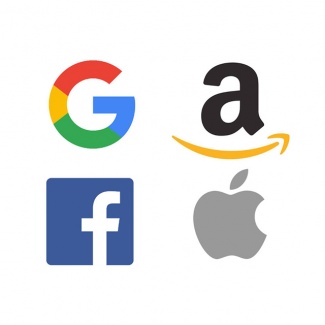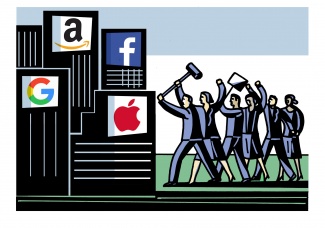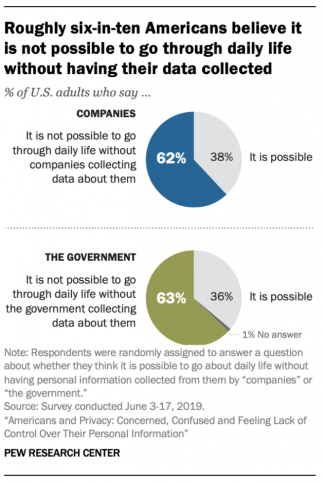The Big Four

The “Big Four” – also known as “The Four”[2], “GAFA”, or “The Four Horsemen” – is an acronym for the large tech companies Google (Alphabet), Apple, Facebook, and Amazon. These four have been separated from other big tech companies on the basis of one characteristic: their ability to influence political and societal change and consumer behavior through their oligopolization of the digital market. As former Google CEO Eric Schmidt has said, they “[drive] the consumer revolution in the minds of the consumer”[3], isolating them from other big tech companies like Microsoft and IBM. However, this immense power has so far gone without major regulation, leaving the Big Four as de facto market regulators.[4] As their size and market dominance expand, the international concern of the Big Four's ethical violation of antitrust laws continues to grow.
Contents
Who are "The Big Four"?
The Big Four have a combined market capitalization of almost $4.5 trillion USD.[5][6] While all four companies operate within the same general digital economy, each company specifically monopolizes an area of the digital market that is mostly different than the others so they don't compete with each other as much. This allows them to dominate their own individual market while creating an oligopoly of the general digital economy.
Run by parent company Alphabet, Google plays to the “head” or “brain” of human beings.[2] With monopolization of search and digital advertising, Google has found itself in several lawsuits regarding their anti-competitive conduct and promotion of Google’s own products in search results over independent competitors. Despite $9 billion in fines, legal action has done little to influence Google’s business practices or market position.[7]
Google has, over time, aggressively acquired more and more companies. These companies include, but are not limited to, Android, YouTube, and AdSense.[8] Android is an operating system for mobile phones which competes with iOS from Apple. As of May 7, 2019, there were over 2.5 billion active devices running Android.[9] Similarly, YouTube is a free video sharing website created in 2005. Every month, visitors watch around 6 billion hours worth of videos.[10] Lastly, AdSense is an advertisement platform that helps website owners earn money by displaying ads.[11] Website owners get paid every time a user clicks on an ad, with the owner getting 68% of the money and Google getting 32% of it. As a result of this, Google makes a large share of its income through AdSense.[12]
In March 2021, Google announced plans to stop using technologies that track individuals across multiple websites[13]. The move was made less than a year after an Anti-trust lawsuit on Google was filed by the U.S Justice Department. It also means that Google will no longer sell ads based on users' browser activity across multiple websites. According to Jounce Media, a digital ad consultancy, Google accounted for 52% of last year’s global digital ad spending of $292 billion[14]. The decision could reshape the digital advertisement business by pushing companies away from individualized web tracking.
Apple
Apple is a technology company that produces and sells phones, computers, services, and more. Some of these products include the iPhone, iPad, Mac, iPod, Apple Watch, and the Apple TV.[15] As of January 2021, there are 1.65 billion Apple devices in use with over a billion iPhones sold.[16] In the 2018 fiscal year, Apple sold more than 217 million iPhones.[17] Year after year, Apple has seen an average trend of increasing revenue with 274.515 billion dollars in revenue for the 2020 fiscal year.[18]
Apple plays on “procreation” by utilizing the common consumer behavior of making irrational decisions.[2] As the most profitable company in history, Apple’s profits are greater than the combined profits of Google, Facebook, and Amazon.[2]
Facebook is a social networking site created in 2004 by Mark Zuckerberg that plays to the “heart” by tapping into the human desire to love and be loved by others (mostly through the use of images and previous relationships that create empathy and expand an individual’s circle of love).[2] It allows people to connect with friends and family over the internet and has over 1 billion users worldwide.[19] In 2020, Facebook generated around 86 billion dollars in revenue, with its main source of income being advertisements on its website. Over time, Facebook has expanded its influence and acquired other social media platforms. According to mobile intelligence firm Apptopia, Facebook owns four of the top 10 most downloaded apps of 2020: WhatsApp, Instagram, Messenger, and Facebook.[20]
Amazon
As the leader in e-commerce with 50% of all online sales occurring through Amazon, the platform plays to the gut or “large intestine” of humans.[2][21] Individuals are biologically programmed to survive and believe the idea that less is bad and more is always better.[2] Their monopolization of e-commerce makes it near impossible for independent merchants to compete with the company.[5] In the late 2000s, for example, Amazon drove an online diapers seller, Quidsi, into selling their company to Amazon by creating a competing product and selling at a loss. Eventually, Amazon’s lower prices caused Quidsi to lose much of its consumer base and they were bought out by Amazon. [22]
Founded in 1994 by Jeff Bezos, Amazon initially sold books online but quickly expanded to music and video sales.[23] Now you can buy almost any material good on Amazon and the company is valued at over $1.6 trillion.[24] Another major component of Amazon’s business model is Amazon Web Services (AWS) which was founded in 2002 and is the world’s largest cloud computing platform. In the fourth quarter of 2020, AWS brought in $12.7 billion in revenue, 10% of all Amazon revenue during that time period.[25] The importance of AWS to the company can be seen by Andy Jassy, the head of AWS since its inception, being named successor as CEO to Jeff Bezos. Bezos will be stepping down during the third quarter of 2021.[26]
Ethical Concerns: Antitrust

As international governments struggle to regulate these multinational corporations, the Big Four face many antitrust allegations. Antitrust is legislation that prevents or controls trusts and other monopolies from dominating the market in efforts to promote competition in business.[28] By tax avoidance, privacy invasion, job destruction, and deregulation, the Big Four have become an oligopoly dominating the digital economy and online market.[2][29]
Anti-competitive Practices
GAFA has been accused of anti-competitive misconduct that has allowed them to dominate the market and deter potential competitors. Their increasing usage of big data and machine learning in business practices have allowed GAFA to lock in users and reinforce network effects.[30] In turn, this has deterred market entry as competitors fear GAFA’s market dominance or are bought-out by GAFA before they have the chance to become a real competitor.[30] Each company exhibits a "Winner-Take-All" business model that enables them to rise to the top of the market at the expense of their competitors.[2][30] This economic system has created an oligopoly where the Big Four already dominate the market, making it nearly impossible to dislodge them from their positions.[30] Each of the four companies dominates a unique section of the digital market that allows them to monopolize their specific industry without experiencing competition from any of the other GAFA companies.
International governments, such as the U.S. Congress and the European Union, struggle to regulate these multinational corporations. Officials launch investigations and file lawsuits against the Big Four in attempts to regulate their behavior and promote fair competition within the digital economy. However, the Big Four have become so large and powerful that legal consequences leave them unphased as they pay the large-sum fines and continue on with their anticompetitive practices.[7][31]
Big Data & Privacy Violation

Like much of big tech, GAFA utilizes its user’s data and private information to predict trends, sculpt user behavior, influence public perceptions, and financial profit from selling this data to third parties. As predicted by French theorist Jean-François Lyotard, the commercialization of knowledge causes shifts in how knowledge and information are valued and shapes social, political, and economic behaviors of society.[33][34] The Big Four are able to take user data, analyze it, and display it back to the individual in a manner that sculpts consumer perspective to align with corporate goals. Consumers see what GAFA wants them to see. Their utilization of intellectual property rights results in data manipulation that edges a digital divide between those (GAFA and big tech) who capitalize on data and the users who provide the data.[34][35] The data collected by GAFA incudes, but is not limited to, a user's IP address, crash reports, system activity, date, time, location, referrer of URL requests, interactions between apps, app usage, carrier name, and operator name.[36] They also collect information on a user's personal name, phone number, payment information, photos, videos, documents, and other highly personal context.[36]
Many of these companies combine user data across their multiple subsidiary companies. For example, the parent company Facebook utilizes the data of Instagram users (Instagram is a subsidiary of Facebook).[37] Similarly, parent company Google collects data on users of GoogleMaps, Gmail, and their other conglomerate businesses and shares this data across all of their subsidiary companies.[36] This means that the data of users on one platform is utilized for a different platform. This collected data is often then sold to third-party businesses that the user has never agreed to share their data with.[36] This means that by accepting GAFA's terms and conditions, you are accepting the reality that these companies will sell your personal data to third-party companies without notifying you which companies now have access to your data.
Users are willing to give away such data because they hold a greater fear of what they could miss out on by not using these platforms than their fear of how GAFA uses their personal data.[38] The Big Four companies have created a digital environment that is so reliant on their platforms and services that the user inconvenience of not using these platforms is greater than many other individual human concerns. In addition, GAFA companies make the physical reading of their terms and conditions documents so difficult that the majority of Americans find it extremely difficult to read the documents.[32] This means many Americans fail to understand how GAFA is collecting their data as they use the platforms and how this data is being used.
However, some believe that because GAFA has designed the infrastructures and tools that make data usable, they hold the “moral right to profit from data”.[34] The analysis and use of data is architectured into the design and business process of these companies; without the use of data, they would be unable to operate.[39] The Big Four's software and hardware infrastructure are reliant on their ability to deliver specialized content and services to internet users.
Privacy Sandbox
In 2021, Google announced the creation of a new-age privacy tool called the "Privacy Sandbox". According to Google, the service will "eliminate third-party cookies by replacing them with viable privacy-first alternatives, developed alongside ecosystem partners, that will help publishers and advertisers succeed while also protecting people’s privacy as they move across the web."^ The Privacy Sandbox will help power technology advancements like FLoC (Federation Learning of Cohorts) to build new ways for businesses to reach people with relevant content and ads. This post-third-party cookie world would occur by digitally clustering large groups of people with similar interests. The approach would effectively hide individuals “in the crowd” and use on-device processing to keep a person’s web history private on the browser.
Antitrust Cases
Google, Facebook, and Amazon are all currently facing antitrust lawsuits from governmental bodies. Apple currently is not facing any cases, however there are reports that Facebook is actively preparing a case against them regarding their App Store policies.[40]
Google is currently facing three separate antitrust lawsuits. The main case against them, set to go to trial sometime in 2023, is led by the US Department of Justice and alleges that Google cut deals with smartphone makers to be the default search engine on the devices.[41] Facebook is facing an antitrust lawsuit from the US Federal Trade Commission that alleges they bought up competitors WhatsApp and Instagram to get rid of them as competition.[42] Amazon is facing charges from the European Union that allege they used data they collected from third party sellers on their site to benefit themselves.[43]
References
- ↑ Cambaceres Avocat. "The GAFA: are they our best enemies?", 11 April 2019, https://cambaceres-avocats.com/en/the-gafa-are-they-our-best-enemies/
- ↑ 2.0 2.1 2.2 2.3 2.4 2.5 2.6 2.7 2.8 Galloway, Scott. The Four: The Hidden DNA of Amazon, Apple, Facebook, and Google, Random House, 3 October 2017
- ↑ The Wall Street Journal. "The New Online Wars", 8 June 2011, https://www.wsj.com/articles/SB10001424052702303657404576362861950356484
- ↑ Pasquale, Frank. "From territorial to functional sovereignty: The case of Amazon", Law and Political Economy, 6 December 2017, https://lpeproject.org/blog/from-territorial-to-functional-sovereignty-the-case-of-amazon/
- ↑ 5.0 5.1 King, Cecilia & McCave, David. "House Lawmakers Condemn Big Tech's 'Monopoly Power' and Urge Their Breakups", The New York Times, 6 October 2020, https://www.nytimes.com/2020/10/06/technology/congress-big-tech-monopoly-power.html
- ↑ Statista. "Market capitalization of selected U.S. tech and internet companies in 2006 and 2020", June 2020, https://www.statista.com/statistics/216657/market-capitalization-of-us-tech-and-internet-companies/
- ↑ 7.0 7.1 Schechner, Sam & Pop, Valentina. "Europe's Antitrust Push Against Google Hasn't Dented Its Heft. Can the U.S.?", The Wall Street Journal, 21 October 2020, https://www.wsj.com/articles/europes-antitrust-push-against-google-hasnt-dented-its-heft-can-the-u-s-11603293443
- ↑ Hartmans, Avery & Meisenzahl, Mary. "All the companies and divisions under Google's parent company, alphabet, which just made yet ANOTHER shake-up to its structure", 2020, https://www.businessinsider.com/alphabet-google-company-list-2017-4#google-adsense-lets-publishers-earn-money-from-online-content-placing-ads-on-publishers-webpages-advertising-drives-the-majority-of-revenue-for-google-29
- ↑ Brandom, Russell. "There are now 2.5 billion active Android devices", 2019, https://www.theverge.com/2019/5/7/18528297/google-io-2019-android-devices-play-store-total-number-statistic-keynote
- ↑ YouTube: What Is youtube? (n.d.). Retrieved March 19, 2021, from https://edu.gcfglobal.org/en/youtube/what-is-youtube/1/
- ↑ Google AdSense - earn money from website monetization. (n.d.). Retrieved March 19, 2021, from https://www.google.com/adsense/start/
- ↑ Chris, Alex. "How does Google AdSense works", 2019, https://www.reliablesoft.net/how-does-google-adsense-works/
- ↑ Schechner, Sam & Hagey, Keach. "Google to Stop Selling Ads Based on Your Specific Web Browsing", 2021, https://www.wsj.com/articles/google-to-stop-selling-ads-based-on-your-specific-web-browsing-11614780021
- ↑ Schechner, Sam & Hagey, Keach. "Google to Stop Selling Ads Based on Your Specific Web Browsing", 2021, https://www.wsj.com/articles/google-to-stop-selling-ads-based-on-your-specific-web-browsing-11614780021
- ↑ Reuters. "AAPL.O - Apple Inc. profile", n.d., https://www.reuters.com/companies/AAPL.O
- ↑ Sujay Vailshery, Lionel. "iPhone sales by year", 2021, https://www.statista.com/statistics/276306/global-apple-iphone-sales-since-fiscal-year-2007/#:~:text=In%20their%202018%20fiscal%20year,more%20than%20217%20million%20iPhones
- ↑ Kastrenakes, Jacob. "Apple says there are now over 1 billion active iPhones", 2021, https://www.theverge.com/2021/1/27/22253162/iphone-users-total-number-billion-apple-tim-cook-q1-2021
- ↑ Macrotrends. "Apple revenue 2006-2020: AAPL", n.d., https://www.macrotrends.net/stocks/charts/AAPL/apple/revenue
- ↑ GCFGLobal. "Facebook: What is facebook?", n.d., https://edu.gcfglobal.org/en/facebook101/what-is-facebook/1/
- ↑ Blacker, Adam. "Worldwide & US Download Leaders 2020", Apptopia, 7 January 2021, https://blog.apptopia.com/worldwide-us-download-leaders-2020
- ↑ Statistica. "Most popular online retail websites worldwide in 2020, by average monthly traffic", 2020, https://www.statista.com/statistics/274708/online-retail-and-auction-ranked-by-worldwide-audiences/
- ↑ Lecher, Colin. "How low prices could make for an antitrust case against Amazon", 2019, https://www.theverge.com/2019/5/13/18563379/amazon-predatory-pricing-antitrust-law
- ↑ “Amazon.com.” Encyclopædia Britannica, Encyclopædia Britannica, Inc., www.britannica.com/topic/Amazoncom.
- ↑ Haselton, Todd. “Jeff Bezos to Step down as Amazon CEO, Andy Jassy to Take over in Q3.” CNBC, CNBC, 2 Feb. 2021, www.cnbc.com/2021/02/02/jeff-bezos-to-step-down-as-amazon-ceo-andy-jassy-to-take-over-in-q3.html.
- ↑ Jordannovet. “Amazon's Cloud Division Reports 28% Revenue Growth; AWS Head Andy Jassy to Succeed Bezos as Amazon CEO.” CNBC, CNBC, 2 Feb. 2021, www.cnbc.com/2021/02/02/aws-earnings-q4-2020.html.
- ↑ Byers, Dylan, and Leticia Miranda. “Jeff Bezos Steps down as Amazon CEO.” NBCNews.com, NBCUniversal News Group, 3 Feb. 2021, www.nbcnews.com/tech/tech-news/jeff-bezos-steps-down-amazon-ceo-n1256540.
- ↑ McCabe, David. "America’s Top Foundations Bankroll Attack on Big Tech", 10 December 2019, https://www.nytimes.com/2019/12/10/technology/americas-top-foundations-bankroll-attack-on-big-tech.html
- ↑ Merrium-Webster. "Antitrust", n.d., https://www.merriam-webster.com/dictionary/antitrust
- ↑ Smyrnaios, Nikos. "L'effet GAFAM : stratégies et logiques de l'oligopole de l'internet", Communication & Languages, 2016, https://www.cairn.info/revue-communication-et-langages1-2016-2-page-61.htm
- ↑ 30.0 30.1 30.2 30.3 Barise, T.P. & Watkins, L. "The Evolution of Digital Dominance: How and Why We Got to GAFA", Digital Dominance, 2018
- ↑ Federal Trade Commission. "FTC Sues Facebook for Illegal Monopolization", 9 December 2020, https://www.ftc.gov/news-events/press-releases/2020/12/ftc-sues-facebook-illegal-monopolization
- ↑ 32.0 32.1 Auxier, Brooke et al. "Americans and Privacy: Concerned, Confused, and Feeling Lack of Control Over Their Personal Information", 15 November 2019, https://www.pewresearch.org/internet/2019/11/15/americans-and-privacy-concerned-confused-and-feeling-lack-of-control-over-their-personal-information/
- ↑ Lyotard, Jean-François. The postmodern condition: A report on knowledge. (Translation from the French by Geoff Bennington & Brian Massumi), Biddles, 1979
- ↑ 34.0 34.1 34.2 Prainsack, Barbara. "Data Donation: How to Resist the iLeviathan", The Ethics of Medical Data Donation, 2019, https://www.ncbi.nlm.nih.gov/books/NBK554068/pdf/Bookshelf_NBK554068.pdf
- ↑ boyd, dana & Crawford, Kate. "Critical Questions for Big Data", 2012, https://www.tandfonline.com/doi/pdf/10.1080/1369118X.2012.678878
- ↑ 36.0 36.1 36.2 36.3 Vigderman, Aliza & Turner, Gabe. "The Data Big Tech Companies Have On You", 2020, https://www.security.org/resources/data-tech-companies-have/
- ↑ Seon Kang, Sunny. "Don't Blame Privacy for Big Tech's Monopoly of Information", 2020, https://www.justsecurity.org/72439/dont-blame-privacy-for-big-techs-monopoly-on-information/
- ↑ Zomorodi, Manoush. "Do You Know How Much Private Information You Give Away Every Day?", Time, 29 March 2017, https://time.com/4673602/terms-service-privacy-security/
- ↑ Metcalf, J., Moss, E., & boyd, d. "Owning Ethics: Corporate Logics, Silicon Valley, and the Institutionalization of Ethics", Social Research: An International Quarterly, 2019, https://datasociety.net/wp-content/uploads/2019/09/Owning-Ethics-PDF-version-2.pdf
- ↑ Canales, Katie. “Facebook Is Reportedly Prepping an Antitrust Lawsuit against Apple Focused on Its App Store Rules.” Business Insider, Business Insider, 28 Jan. 2021, www.businessinsider.com/facebook-apple-antitrust-lawsuit-app-store-2021-1.
- ↑ Nieva, Richard. “Google's Three Antitrust Battles: Here's What You Need to Know.” CNET, www.cnet.com/news/googles-three-antitrust-battles-heres-what-you-need-to-know-faq/.
- ↑ Smith, Kelly Anne. “What You Need To Know About The Facebook Antitrust Lawsuit.” Forbes, Forbes Magazine, 28 Jan. 2021, www.forbes.com/advisor/investing/facebook-antitrust-lawsuit/.
- ↑ Selyukh, Alina. “Amazon Faces Antitrust Charges From European Regulators.” NPR, NPR, 10 Nov. 2020, www.npr.org/2020/11/10/879643610/amazon-faces-antitrust-charges-from-european-regulators.